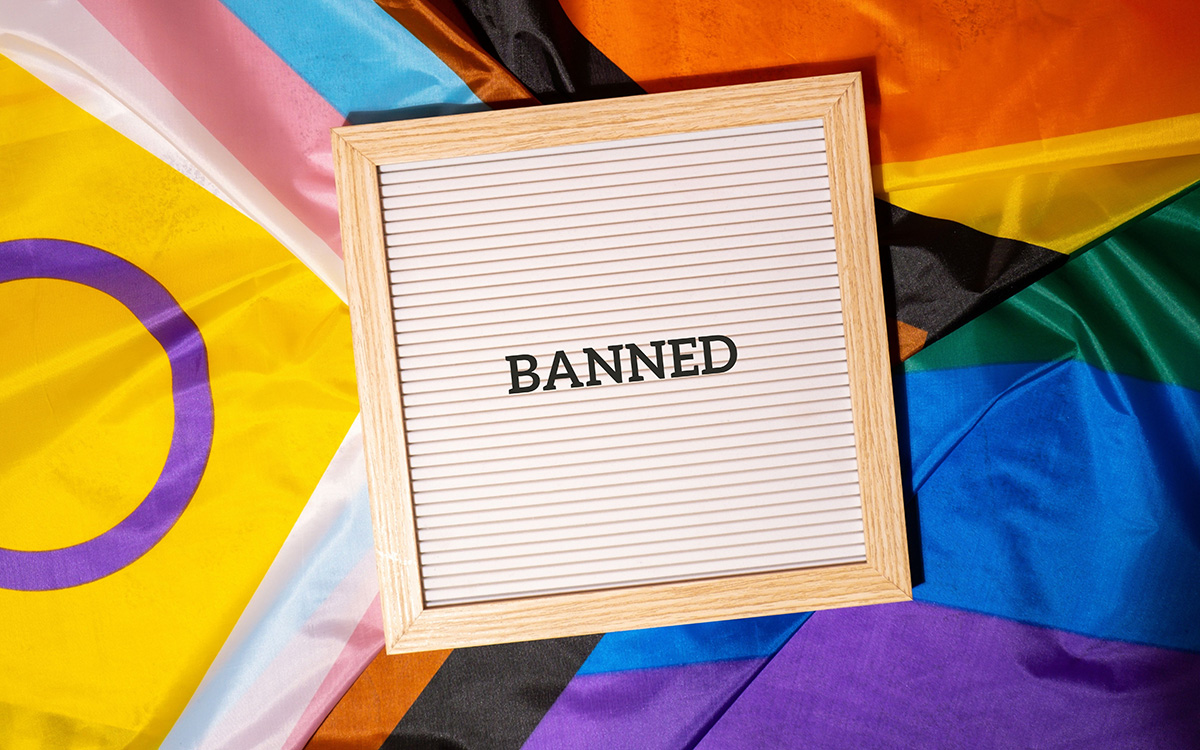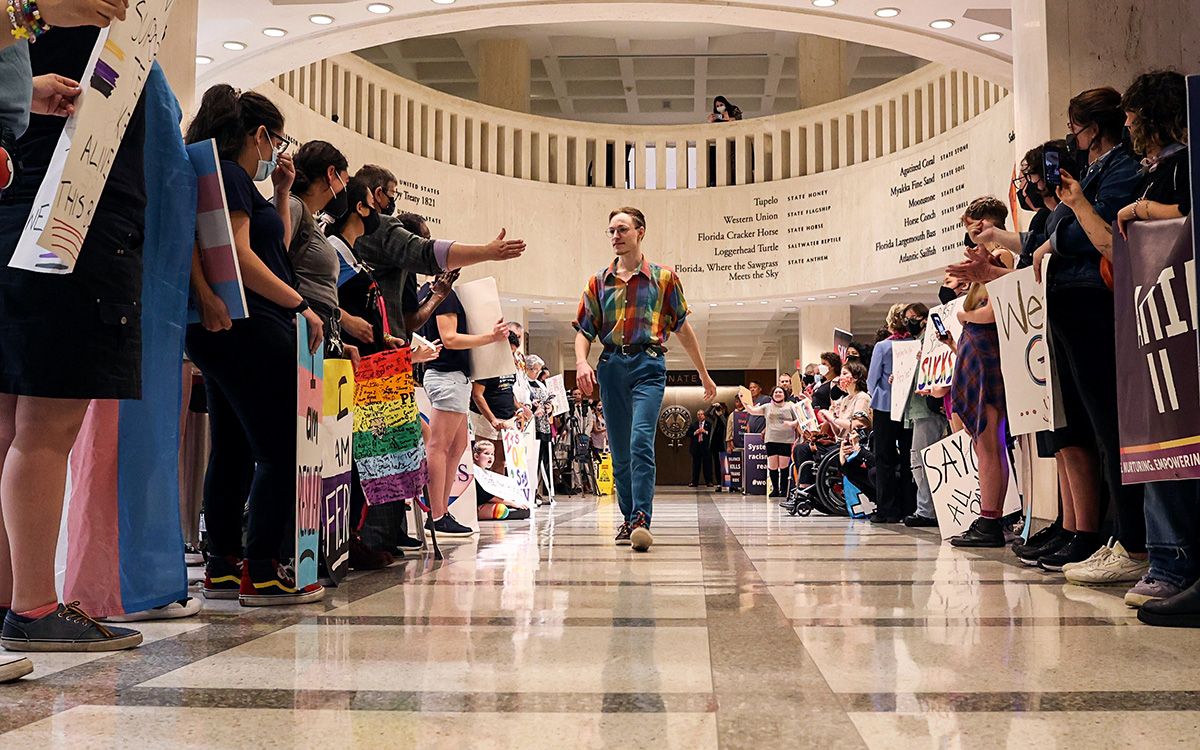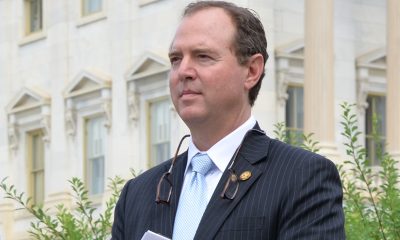National
From LGBTQ book bans to internet bans: A bipartisan attack on knowledge
Online safe spaces for queer youth increasingly at risk

“They had LGBTQ-inclusive books in every single classroom and school library,” Maxx Fenning says of his high school experience. “They were even working on LGBTQ-specific course codes to get approved by the state,” he said, describing courses on queer studies and LGBTQ Black history.
No, Fenning didn’t grow up in Portland or a Boston suburb. Fenning graduated from a South Florida high school in 2020. Florida’s transformation from mostly affirming to “Don’t Say Gay” has been swift, he says. “It feels like a parallel universe.”
Fenning, who just graduated from the University of Florida, follows the developments closely as the executive director of PRISM FL Inc., a youth-led LGBTQ nonprofit he founded at 17. “I’ve watched so many of the things that I kind of took advantage of be stripped away from all of the students that came after me,” Fenning says. “It’s one thing to be in an environment that’s not supportive of you. It’s another thing to be in an environment that’s supportive of you and then watch it fall apart.”
“It’s just gut-wrenching,” Fenning explained, describing how Florida’s increasingly hostile legislation has transformed the state he has lived in most of his life.
Most recently, Florida passed HB3, “Online Protections for Minors,” which bans youth under 14 from having social media accounts. Youths aged 14 and 15 need parental consent before getting accounts and any minor must be protected from “harmful content” online.
Unlike the previous legislation, which came predominately from the right and directly targeted issues like gender-affirming healthcare or DEI, HB3 is part of a bipartisan push across the country to regulate social media, specifically for youth. HB3 was co-sponsored by Michele K. Rayner, the openly queer Black member of the Florida Legislature, alongside many of her colleagues across the aisle. Similar national legislation, like Kids Online Safety Act, includes 68 Democratic and Republican sponsors.
Shae Gardner, policy director at LGBT Tech, explains that this legislation disproportionately harms LGBTQ youth, regardless of intentions or sponsors.
Gardner says that while all these bills claim they are for the safety of kids, for LGBTQ youth, “you are putting them at risk if you keep them offline.” She explains that “a majority of LGBTQ youth do not have access to affirming spaces in their homes and their communities. They go online to look like that. A majority say online spaces are affirming.”
Research by the Trevor Project, which reports that more than 80% of LGBTQ youth “feel safe and understood in specific online spaces” backs this up. Specific online spaces that are under target from legislation, like TikTok, are disproportionately spaces where LGBTQ youth of color feel safest.
“For LGBTQ people, social media has provided spaces, which are, at once both public and private, that encourage, and enhance … a great deal of self-expression that is so important for these communities,” confirms Dr. Paromita Pain, professor, Global Media Studies & Cybersecurity at University of Nevada, Reno. She is the editor of the books “Global LGBTQ Activism” and “LGBTQ digital cultures.”
Fenning emphasizes that with bills like “Don’t Say Gay,” in Florida — and other states including North Carolina, Arkansas, Iowa, and Indiana — LGBTQ youth have less access to vital information about their health and history. “Social media [are] where young people increasingly turn to get information about their community, their history, their bodies and themselves.”
At PRISM, Fenning works to get accurate, fact-backed information to Florida youth through these pathways, ranging from information on health and wellbeing to LGBTQ history to current events. The feedback has been overwhelmingly positive. Often youth tell him “I wish I learned this in school,” which is a bittersweet feeling for Fenning since it represents how much young LGBTQ youth are missing out on in their education.
Morgan Mayfaire, executive director of TransSOCIAL, a Florida advocacy group, said that these internet bans are an extension of book bans, because when he was a teen, books were his pathway into the LGBTQ community. “For me it was the library and the bookstores that we knew were LGBTQ friendly.” Now 65, Mayfaire understands that “kids today have grown up with the internet. That’s where they get all their information. You start closing this off, and you’re basically boxing them in and closing every single avenue that they have. What do you think is going to happen? Of course, it’s going to have an impact emotionally and mentally.”
Fenning says that social media and the internet were powerful to him as a teen. “I was able to really come into my own and learn about myself also through social media. It was really powerful for me, building a sense of self.” Gardner agrees, sharing that legislation like this, which would have limited “15-year-old me, searching ‘if it was OK to be gay’ online, would have stagnated my journey into finding out who I was.”
Gardner also explains that many of the bills, like HB3, limit content that is “harmful” or “obscene” but do not specifically define what that content is. Those definitions can be used to limit LGBTQ content.
“Existing content moderation tools already over-censor LGBTQ+ content and users,” says Gardner, “they have a hard time distinguishing between sexual content and LGBTQ+ content.” Pain emphasizes that this is no accident, “there are algorithms that have been created to specifically keep these communities out.”
With the threat of fines and litigation from HB3, says Gardner, “moderation tools and the platforms that use them is only going to worsen,” especially since the same legislators may use the same terms to define other queer content like family-friendly drag performances.
In addition to being biased, it has devastating effects on LGBTQ youth understanding of their sense of identity, Fenning explains. “That perception of queer people as being overly sexual or their relationships and love being inherently sexual in a way that other relationships aren’t does harm to our community.”
Gardner acknowledges that online safety has a long way to go — pointing to online harassment, cybercrime, and data privacy—but that these bills are not the correct pathways. She emphasizes “everybody’s data could be better protected, and that should be happening on a federal level. First and foremost, that should be the floor of protection.”
She also emphasizes that content moderation has a long way to go from targeting the LGBTQ community to protecting it. “Trans users are the most harassed of any demographic across the board. That is the conversation I wish we were having, instead of just banning kids from being online in the first place.”
Being queer on the ground in Florida is scary. “The community is very fearful. This [legislation] has a big impact on us,” explains Mayfaire.
“I mean, it sucks. Right?” Fenning chuckles unhappily, “to be a queer person in Florida. In a state that feels like it is just continuously doing everything it can to destroy your life and all facets and then all realms.”
Despite the legislative steamrolling, several court wins and coordinated action by LGBTQ activists help residents see a brighter future. “There’s a weird tinge of hope that that has really been carrying so many queer people and I know myself especially this year as we’re seeing the rescinding of so many of these harmful policies and laws.”

For example, this March, Florida settled a challenge to its “Don’t Say Gay” legislation that significantly lessens its impact. Already, experts warn that HB3 will face legal challenges.
Pain emphasizes that social media is central to LGBTQ activism, especially in Florida. “There have been examples of various movements, where social media has been used extremely effectively, to put across voices to highlight issues that they would not have otherwise had a chance to talk about,” she says, specifically citing counteraction to “Don’t Say Gay.” That is another reason why legislation like this disproportionately harms LGBTQ people and other minority groups, it limits their ability to organize.
Fenning emphasizes that HB3 directly attacks spaces like PRISM, which do not just share information for the LGBTQ community, but provide spaces for them. “Foundationally it provides an opportunity for the community,” he says, but more than anything, it provides a space, where “you can you can learn from your queer ancestors, so to speak, and take charge.” And that is invaluable.
(This story is part of the Digital Equity Local Voices Fellowship lab through News is Out. The lab initiative is made possible with support from Comcast NBCUniversal.)
National
National resources for trans and gender diverse communities
Amid attacks, help is available from wide range of organizations

The Trump administration has launched a series of executive orders and other initiatives restricting the rights of the transgender community since taking power in January, targeting military service, affirming healthcare, and participation in sports.
Though many executive orders are being challenged in court, it’s an uncertain time for a community that feels threatened. Despite the uncertainty, there are resources out there to help.
From legal assistance to mental health support, here’s a list of nonprofits and organizations dedicated to improving the everyday livelihood of trans and gender diverse people. These are mostly national organizations; there are many additional groups that work in local communities across the country. Some of these national groups will connect those in need of help to a local organization.
LEGAL HELP
President Trump issued an executive order declaring there are only two genders –– male and female –– which applies to legal documents and passports. The order doesn’t recognize the idea that one can transition their gender at birth to another gender.
Ash Lazarus Orr filed to renew his passport with a gender marker reflecting his identity. That was in January, and he still hasn’t received it. He refused to accept a passport without an accurate identification of who he is, so he filed a lawsuit with the ACLU in what is now known as Orr v. Trump.
Orr told the Washington Blade that not receiving his passport back has taken away his freedom of visiting family in Canada and receiving gender-affirming care from a trusted provider in Ireland.
The one thing getting him through this uncertain time is knowing who he’s fighting for –– the trans community, his loved ones, and himself.
“I’m trying to be that person that those younger parts of me needed growing up,” Orr said. Check out a couple of legal support organizations below:
Transgender Law Center
The Transgender Law Center (TLC) provides legal resources and assistance. TLC has a list –– called the Attorney Solidarity Network –– of attorneys that can provide advice or representation for trans people.
The organization also has a legal information help desk that answers questions regarding laws or policies impacting trans people.
Website: transgenderlawcenter.org
Phone: 510-587-9696
Email: [email protected]
Advocates For Trans Equality
With a variety of different programs tailored toward legal assistance and advocacy work, Advocates For Trans Equality’s reach is wide.
The non-profit offers the Name Change Project, which provides pro bono legal name change services to low-income trans, gender-non-conforming and nonbinary people by utilizing its partnerships with law firms and corporate law departments.
Advocates For Trans Equality also has departments and programs dedicated to increasing voter engagement, educating lawmakers on trans issues and offering litigation assistance to a small number of cases.
Website: transequality.org
Phone: 202-642-4542
General email: [email protected]
To contact a specific department or program, visit its website above.
ADVOCACY
Looking to take action and get involved? Act now.
American Civil Liberties Union
The ACLU is a national nonprofit organization that mobilizes local communities and advocates for national causes.
Getting involved is as easy as filling out letters to representatives or signing petitions. One live petition is to “defend trans freedom.”
You can also join its People Power platform, where you serve as a volunteer in your community to “advance civil liberties and civil rights for all.” ACLU has different chapters across the country, so visit its website for more information.
Website: aclu.org
Phone: 212-549-2500
MILITARY AND VETERANS
Trump signed an executive order in January banning transgender service members from serving, stating their identity “conflicts with a soldier’s commitment to an honorable, truthful and disciplined lifestyle, even in one’s personal life.”
Though the order has been legally challenged and struck down by a judge, U.S. Navy Lieutenant Rae Timberlake said it’s created an uncertain atmosphere for themself and other troops.
“All of the transgender service members I know have served with honor and integrity for many years…[and we’re] targeted for removal and not subject to any kind of review based on merit,” Timberlake, who joined the Navy at age 17, said. “There’s kind of just this cloud looming over our organizations and our units, because we know any day our transgender shipmates could no longer be on the team.”
But Timberlake’s message to any service member struggling because of the executive order was one of compassion and truth: “There’s no policy that can take away what you’ve accomplished and what you’ve done.”
Here are some organizations that support service members and veterans:
SPARTA Pride
SPARTA is a peer-support group composed of active duty, veteran and “future warrior” service members.
The group also engages in advocacy work and has helped change policies on gender neutral uniforms and reducing the time a trans service member would have to wait to return to their duties during their transition.
Contact SPARTA to learn more about joining its support network.
Website: spartapride.org
Email: [email protected]
Modern Military Association
Modern Military supports service members and veterans through advocacy, legal assistance and mental health support.
It tracks LGBTQ+ and HIV discrimination through reports made on its website, and offers guidance and advice to whoever submitted the report.
It also supports the mental health of LGBTQ+ veterans and their families through its Resilient Heroes Program. By signing up, you’ll receive virtual peer support and case management services with a mental health coordinator.
Website: modernmilitary.org
Phone: 202-328-3244
Email: [email protected]
CRISIS & MENTAL HEALTH SUPPORT
If you have a more urgent matter, or just need someone to listen, here are some organizations you can reach out to:
The Trevor Project
The Trevor Project offers 24/7 counseling services. Calling, texting or chatting is free and confidential, and you’ll get to speak with someone specialized in supporting LGBTQ youth.
The organization also focuses on public education by hosting online LGBTQ suicide prevention trainings. It advocates for policies and laws that contribute to supporting queer youth.
Website: thetrevorproject.org
Crisis hotline: 1-866-488-7386
General inquiry phone number: 212-695-8650
Trans Lifeline
Trans Lifeline is a hotline run and operated by trans people. Whether you’re questioning if you’re trans or are a trans person just wanting to talk, someone will be there to help. It’s free and confidential, and there won’t be any non-consensual active rescue, such as calling the emergency services.
The line is not 24/7, however. Check out its website for hours within your time zone.
Website: translifeline.org
Phone: 877-565-8860
Here are other organizations that offer support to the trans community:
TransFamilies (support): Support for families with a gender diverse child.
TransLatina Coalition (advocacy): Advocates for the specific needs of the transgender, gender expansive and intersex communities in the U.S.
TransAthlete (information): Provides informative resources about trans athletes.
Campaign for Southern Equality’s Trans Youth Emergency Project (healthcare support): A fund to help trans youth access lifesaving healthcare.
TransTech Social (economic empowerment): Dedicated to discovering and empowering the career-ready skills of LGBTQ+ people.
World Professional Association For Transgender Health (health): Resources, symposiums and research dedicated to improving transgender health.
Sylvia Rivera Law Project (legal): Legal programs and services for marginalized communities.
Gender Spectrum (support): Resources and support groups for trans youth and families.
The Okra Project (support): Creates and supports initiatives that provide resources for the Black Trans community.
The White House
White House does not ‘respond’ to reporters’ requests with pronouns included
Government workers were ordered not to self-identify their gender in emails

White House Press Secretary Karoline Leavitt and a senior advisor in the Department of Government Efficiency rejected requests from reporters who included their pronouns in the signature box of their emails, each telling different reporters at the New York Times that “as a matter of policy,” the Trump-Vance administration will decline to engage with members of the press on these grounds.
News of the correspondence between the journalists and the two senior officials was reported Tuesday by the Times, which also specified that when reached for comment, the White House declined to “directly say if their responses to the journalists represented a new formal policy of the White House press office, or when the practice had started.”
“Any reporter who chooses to put their preferred pronouns in their bio clearly does not care about biological reality or truth and therefore cannot be trusted to write an honest story,” Leavitt told the Times.
Department of Government Efficiency Senior Advisor Katie Miller responded, “I don’t respond to people who use pronouns in their signatures as it shows they ignore scientific realities and therefore ignore facts.”
Steven Cheung, the White House communications director, wrote in an email to the paper: “If The New York Times spent the same amount of time actually reporting the truth as they do being obsessed with pronouns, maybe they would be a half-decent publication.”
A reporter from Crooked media who got an email similar to those received by the Times reporters said, “I find it baffling that they care more about pronouns than giving journalists accurate information, but here we are.”
The practice of adding pronouns to asocial media bios or the signature box of outgoing emails has been a major sticking point for President Donald Trump’s second administration since Inauguration Day.
On day one, the White House issued an executive order stipulating that the federal government recognizes gender as a binary that is immutably linked to one’s birth sex, a definition excludes the existence of intersex and transgender individuals, notwithstanding the biological realities that natal sex characteristics do not always cleave neatly into male or female, nor do they always align with one’s gender identity .
On these grounds, the president issued another order that included a directive to the entire federal government workforce through the Office of Personnel Management: No pronouns in their emails.
As it became more commonplace in recent years to see emails with “she/her” or “he/him” next to the sender’s name, title, and organization, conservatives politicians and media figures often decried the trend as an effort to shoehorn woke ideas about gender (ideas they believe to be unscientific), or a workplace accommodation made only for the benefit of transgender people, or virtue-signaling on behalf of the LGBTQ left.
There are, however, any number of alternative explanations for why the practice caught on. For example, a cisgender woman may have a gender neutral name like Jordan and want to include “she/her” to avoid confusion.
A spokesman for the Times said: “Evading tough questions certainly runs counter to transparent engagement with free and independent press reporting. But refusing to answer a straightforward request to explain the administration’s policies because of the formatting of an email signature is both a concerning and baffling choice, especially from the highest press office in the U.S. government.”
U.S. Military/Pentagon
Air Force rescinds rule barring inclusion of preferred pronouns in email signatures
Conflict with language in military funding package may explain reversal

The U.S. Air Force has issued a “directive to cease the use of ‘preferred pronouns’ (he/him, she/her, or they/them) to identify one’s gender identity in professional communications,” according to a report published in the Hill on Wednesday.
The rule, which applies to both airmen and civilian employees, was first adopted on Feb. 4 pursuant to President Donald Trump’s anti-transgender executive order called, “Defending Women from Gender Ideology Extremism and Restoring Biological Truth to the Federal Government.”
Days after the administration’s issuance of that order on the first day of the president’s second term, the Office of Personnel Management instructed agencies across the whole of the federal government to remove pronouns from email signatures and enforce the policy barring employees from using them.
Additionally, on Jan. 27 Trump published an order barring trans people from joining the U.S. Armed Forces, indicating that those who are currently in serving would be separated from the military. The Pentagon is fending off legal challenges to the ban in federal courts.
Particularly given the extent of the new administration’s efforts to restrict the rights of trans Americans and push them out of public life, the Air Force’s reversal of the pronoun guidance was surprising.
According to reporting in Military.com, the move might have come because officials concluded the rule was in conflict with language in the military appropriations funding legislation passed by Congress in 2023.
The NDAA established that the defense secretary “may not require or prohibit a member of the armed forces or a civilian employee of the Department of Defense to identify the gender or personal pronouns of such member or employee in any official correspondence of the Department.”
-

 Opinions5 days ago
Opinions5 days agoIt’s time for new leadership on the Maryland LGBTQIA+ Commission
-

 The White House4 days ago
The White House4 days agoWhite House does not ‘respond’ to reporters’ requests with pronouns included
-

 Arts & Entertainment5 days ago
Arts & Entertainment5 days ago‘Gay is Good’ Pride Pils Can Celebrates Frank Kameny’s 100th Birthday for WorldPride in D.C.
-

 Sponsored5 days ago
Sponsored5 days agoTHC Drinks: What You Should Know About Cannabis Beverages












